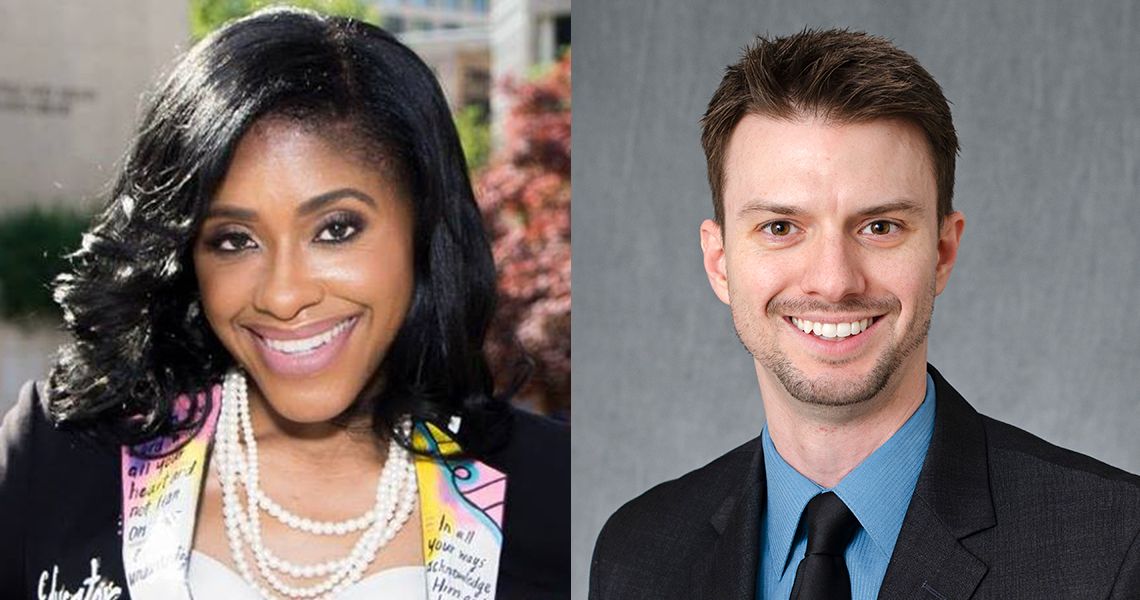
They serve in different departments. They have dissimilar research. One’s a clinician, one’s not. Harrison Reed and Maranda Ward might not appear to have a lot in common, but they both agree that the Emerging Scholars Fellowship (ESF) is a boon for their academic careers.
“Through the Emerging Scholars Fellowship, I have had the protected time to lead health and racial equity research and disseminate its outcomes in ways I had yet to experience,” said Ward, assistant professor in the Department of Clinical Research and Leadership at the George Washington University (GW) School of Medicine and Health Sciences (SMHS). “This is invaluable as a junior investigator with a heavy teaching load.”
Ward and Reed, assistant professor in the Department of PA Studies at SMHS , are the first two recipients of the ESF which provides early and mid-career faculty with salary support for protected time and individualized mentorship from senior scholars for one academic year, with an option to secure a second year of funding. The protected time and mentorship help faculty launch their scholarly careers and research trajectories. The program also enables faculty to build their scholarly networks through team science, collect and analyze pilot data, and disseminate their work to build their national reputation, and achieve future funding.
“We are forging new ground with this state-of-the art education and training fellowship for burgeoning health professions scholars,” said SMHS associate dean Anthony Artino who is directing ESF. The program is an example of how the GW Health Sciences division is “Catalyzing Innovation and Entrepreneurism,” a focus area of the Health Sciences Strategic Plan 2020-2023.
Reed has appreciated his experience and endorses ESF. "The Emerging Scholars Program is a great opportunity for early career researchers to utilize the protected time and dedicated mentorship that is often difficult to obtain without external grant funding,” he said. “For faculty who have primarily focused on education, it's an excellent first foray into the world of research. It allowed me to connect with researchers and academics outside of my usual professional circles."
Reed is using ESF support to study the effect of interpersonal workplace behavior on PAs. The interactions of health care professionals and the environment these behaviors create plays a pivotal role in important institutional and health-related outcomes. His exploratory work will inform interventions to mitigate toxic workplace behavior and improve the wellbeing and efficacy of the 130,000+ certified PAs practicing in the United States.
The program has enabled Ward to lead the educational efforts of SMHS’s Anti-Racism Coalition and manage a multidisciplinary student research lab, the Coalition for Restructuring Education via Health Equity and Antiracism Leading to Health. The lab is piloting a department-level antiracism demonstration project that will be scaled and replicated more widely across SMHS’s medical enterprise.
ESF is funded by GW Health Sciences. Artino said the program is moving toward a "shared funding" model where the division covers about 10 percent of a fellow’s salary and the chair of the faculty member's department agrees to cover the other 10 percent. “The goal is to cover 20 percent of the faculty member's time, so they can have one day per week of protected time to participate in the Emerging Scholars Fellowship,” Artino added.
The program is currently limited to two scholars per year, but Artino would like to eventually expand so up to four fellows can participate annually. The application and selection process for the next class of fellows will open in Spring 2022. A letter of nomination (self-nominations are allowed), as well as a letter of support from the faculty member's chair will be required.
For more information on ESF, contact aartino [at] gwu [dot] edu (aartino[at]gwu[dot]edu)